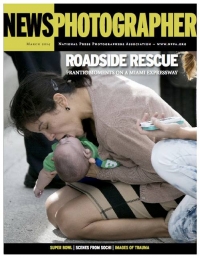NPPA gives Humanitarian Award to photojournalist Al Diaz
posted Tuesday, March 11, 2014 at 1:07 PM EDT

Something extraordinary happened to Miami photojournalist Al Diaz in February. Stuck on freeway in Florida, he saw a woman screaming for help outside of her SUV, as her baby nephew had just stopped breathing. Running to help, Diaz put his job as a journalist second, acting as a decent human being first, making sure that the situation was in hand, fetching trained assistance, and making sure emergency services were on the way before reaching for his camera. And for his remarkable actions, Diaz has just been given the NPPA's Humanitarian Award.
Diaz waded into the traffic on the highway to find a police officer who was able to come to the aid of the five month old. The aunt and the officers were able to keep the baby breathing long enough for emergency responders to arrive, and get the child to hospital. Diaz' images, taken after he had rendered help, swiftly went viral, and the baby has since been through surgery to treat the tracheal cysts that were making it difficult to breathe.
Speaking on the award, NPPA president Mark Dolan said:
"I think Al's actions exemplify the ethical and humanitarian stand that NPPA has taken over the years. It's important for all photojournalists to remember that you don't have to lay down your humanity when you pick up a camera. Al did just that, he put the welfare of the child first and made sure he did all that he could do, and it wasn't until he realized that things were well in other people's sure hands that he took up his camera and began making images. And they were incredible images at that."
It's an oft repeated refrain that journalists should report the news, and not become it. But there are certain times when the need to help another human being overcomes arguments of neutrality. In 2010, Anderson Cooper saved a child's life while in Haiti. Photographer Kevin Carter's actions (or lack thereof) around the photo of a starving child and a vulture in Sudan sparked a major debate about ethics in journalism—made especially poignant by the fact that Carter took his own life soon after being awarded a Pulitzer prize for the image.
Diaz' actions speak to a need to act like a good human being first and a photojournalist second—and it shows that it's still possible to get the shot you need after doing as much as you can to help.